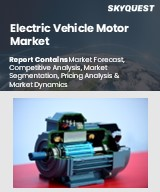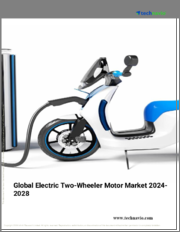
|
시장보고서
상품코드
1577130
자동차용 로터 및 스테이터 시장 예측 : 모터 유형별, 소재별, 차량 유형별, 스테이터 유형별, 로터 유형별, 용도별, 지역별 분석(-2030년)Automobile Rotor Stator Market Forecasts to 2030 - Global Analysis By Motor Type, Material, Vehicle Type, Stator Type, Rotor Type, Application and By Geography |
||||||
Stratistics MRC에 따르면 세계의 자동차용 로터 및 스테이터 시장은 2024년에 132억 9,503만 달러로 추정되고, 2030년에는 240억 7,153만 달러에 이를 것으로 예측되며, 예측 기간 중 CAGR은 10.4%로 전망됩니다.
자동차용 로터 및 스테이터 시스템이란, 다양한 자동차 용도, 특히 전기자동차나 하이브리드 자동차에 있어서의 로터와 스테이터의 조합 어셈블리를 가리킵니다. 스테이터는 통전 시 자기장을 발생시키고 로터는 이 자기장에 의해 구동되어 기계 동력을 만들어냅니다. 전기자동차(EV) 수요 증가와 모터 기술의 발전으로 이 시장은 성장할 전망입니다.
국제 자동차 공업회(OICA)에 따르면 전년에는 전 세계에서 약 8,500만대의 자동차가 생산되어 전년에 비해 6% 증가했습니다. 국제에너지기구(IEA)에 따르면 2022년 전기차 세계 판매 대수는 강력하게 증가하고 있으며, 1분기 판매 대수는 200만대로 2021년 동시기부터 75% 증가했습니다.
안전기능 채용 증가
복잡한 운전 지원 시스템과 자율 주행 기술에 대한 수요가 높아짐에 따라 자동차용 로터 및 스테이터 시장의 성장을 뒷받침하고 있습니다. 전동 파워 스티어링이나 브레이크 시스템과 같은 안전성이 중요한 컴포넌트는 정확한 제어와 응답성을 위해 효율적인 로터 스테이터 어셈블리에 의존하고 있습니다. 자동차 제조업체가 안전 기준과 소비자의 기대에 부응하려고 노력하는 중 고성능 로터와 스테이터는 전기자동차와 하이브리드 자동차의 신뢰성이 높고 에너지 효율이 높고 고장에 강한 안전 기능을 실현하는 데 필수적입니다.
재료비 상승
효율적인 전기 모터를 생산하기 위해서는 보다 현대적인 재료가 필요하기 때문에 재료비 상승이 시장에 큰 영향을 미칩니다. 세계 공급망 중단은 실리콘계 재료와 고성능 전기강을 포함한 주요 부품의 가격 상승을 야기하고 있습니다. 용접 및 스탬핑과 같은 전문 기술이 필요한 복잡한 생산 절차로 인해 비용이 더욱 증가하고 있습니다. 경제적 제약은 제조업체의 기술 혁신과 적응 능력을 저해할 수 있으며, 자동차용 로터 및 스테이터 시장 전체의 성장과 경쟁력에 영향을 미칩니다.
자동차 기술의 진보
자동차 기술 개척은 특히 자동차 부문이 전기화를 향해 자동차용 로터 및 스테이터 시장을 궁극적으로 추진하게 됩니다. 전기자동차와 하이브리드 자동차가 출력과 에너지 관리를 극대화하려면 고효율 로터와 스테이터 부품이 필요합니다. 경량 설계는 성능과 내구성을 높이는 제조 기술과 재료의 발전으로 가능합니다. AI 및 IoT와 같은 스마트 기술의 통합으로 인한 복잡한 로터 및 스테이터 솔루션의 필요성으로 시장이 확대되고 있습니다.
경기 변동
경기 변동은 자동차용 로터 및 스테이터 제품 수요에 큰 영향을 줄 수 있습니다. 경기후퇴 국면에서는 소비자의 신차 구입액이 감소하고, 로터 및 스테이터와 같은 자동차 부품 수요가 저하되어 생산량이 감소할 가능성이 있습니다. 한편, 경기 확대 시에는 자동차의 판매 대수가 늘어나 로터 및 스테이터의 필요성이 높아질지도 모릅니다. 이러한 차이는 생산자의 수익성에 영향을 미치고 마켓플레이스에 의심을 초래할 수 있습니다.
COVID-19의 영향
자동차용 로터 및 스테이터의 판매는 COVID-19의 유행에 의해 큰 영향을 받았습니다. 세계의 가동 중단과 공급망의 혼란은 자동차 제조의 급격한 우울을 야기하여 자동차 부품 수요를 줄였습니다. 한편 경기가 상승하기 시작했고 자동차 수요가 증가했기 때문에 로터 및 스테이터 시장도 확대되기 시작했습니다. 팬데믹은 특수한 로터 및 스테이터를 필요로 하는 전기자동차 수요를 끌어올려 그 보급을 가속화했습니다. 종합적으로 생각하면, COVID-19의 유행은 어려움을 가져왔지만, 자동차용 로터 및 스테이터 산업에 혁신과 확대의 기회도 가져왔습니다.
예측 기간 동안 규소강 부문이 최대가 될 전망
규소강 부문은 우수한 전도성과 자성으로 인해 최대가 될 것으로 추정됩니다. 발전기나 전동기의 운전에 필요한 자기장을 발생시키는데 필수적인 스테이터 코어의 제조에 널리 이용되고 있습니다. 규소강을 로터 및 스테이터에 사용함으로써 성능이 향상되고, 에너지 손실이 감소하고, 효율이 향상됩니다. 전기자동차와 하이브리드 자동차 수요가 증가함에 따라 로터 및 스테이터에서 규소강의 사용량이 증가할 것으로 예상됩니다.
예측 기간 동안 전동 파워 스티어링(EPS) 분야가 가장 높은 CAGR이 예상됩니다.
자동차에 대한 EPS(Electronic Power Steering) 시스템의 통합이 진행됨에 따라 Electric Power Steering(EPS) 분야는 예측 기간 동안 가장 높은 CAGR을 나타낼 것으로 예상됩니다. EPS 기술은 기존의 유압 시스템을 전기 모터로 대체하고 도로 상황에 따라 스티어링 어시스트를 변경하여 자동차 핸들링과 연비를 향상시킵니다. 성능이 향상됨에 따라 이러한 변화는 에너지 사용량을 줄이고 지속가능성을 중시하는 업계 자세와 일치합니다.
최대 점유율을 차지하는 지역 :
예측 기간 동안 아시아태평양이 가장 큰 시장 점유율을 차지할 것으로 예상됩니다. 이는 특히 중국과 인도 등 국가에서 자동차 산업이 급성장하고 있기 때문에 자동차 생산 증가로 고품질의 로터 및 스테이터 부품이 요구되는 데 크게 기여하고 있습니다. 게다가 전기자동차(EV)와 하이브리드 자동차의 보급이 진행되고 있기 때문에 첨단 로터 및 스테이터 기술에 의존하는 효율적인 전기 모터 시스템 수요가 급증하고 있습니다. 게다가 지속가능성과 배출량 감축을 추진하는 정부의 이니셔티브는 제조업체들에게 혁신적인 자동차 기술에 대한 투자를 촉진하고 이 지역 시장 성장을 더욱 촉진하고 있습니다.
CAGR이 가장 높은 지역 :
북미는 전기차(EV)의 보급이 진행되고 있기 때문에 예측기간 동안 가장 높은 CAGR을 나타낼 것으로 예측됩니다. 또한 안전 기능과 운전 지원 시스템에 대한 주목이 높아지고 있기 때문에 전동 파워 스티어링이나 브레이크 시스템에 있어서의 신뢰성이 높은 로터 및 스테이터 부품에 대한 수요가 높아지고 있습니다. 대기업 자동차 제조업체와 기술 혁신의 거점이 존재하는 것도 고성능, 에너지 효율적인 자동차에 대한 소비자의 기호와 함께 시장의 성장을 더욱 뒷받침하고 있습니다.
무료 주문을 받아서 만드는 서비스 :
이 보고서를 구독하는 고객은 다음 무료 맞춤설정 옵션 중 하나를 사용할 수 있습니다.
- 기업 프로파일
- 추가 시장 기업의 종합적 프로파일링(3개사까지)
- 주요 기업의 SWOT 분석(3개사까지)
- 지역 세분화
- 고객의 관심에 응한 주요국 시장 추계, 예측 및 CAGR(주 : 타당성 확인에 따름)
- 경쟁 벤치마킹
- 제품 포트폴리오, 지리적 존재, 전략적 제휴에 기반한 주요 기업 벤치마킹
목차
제1장 주요 요약
제2장 서문
- 개요
- 이해관계자
- 조사 범위
- 조사 방법
- 데이터 마이닝
- 데이터 분석
- 데이터 검증
- 조사 접근
- 조사 정보원
- 1차 조사 정보원
- 2차 조사 정보원
- 전제조건
제3장 시장 동향 분석
- 성장 촉진요인
- 억제요인
- 기회
- 위협
- 용도 분석
- 신흥 시장
- COVID-19의 영향
제4장 Porter's Five Forces 분석
- 공급기업의 협상력
- 구매자의 협상력
- 대체품의 위협
- 신규 참가업체의 위협
- 경쟁 기업간 경쟁 관계
제5장 세계의 자동차용 로터 및 스테이터 시장 : 모터 유형별
- 브러시리스 DC 모터
- 유도 모터
- 영구자석 동기 모터(PMSM)
- 동기 릴럭턴스 모터(SynRM)
- 기타 모터 유형
제6장 세계의 자동차용 로터 및 스테이터 시장 : 소재별
- 규소강
- 구리
- 알루미늄
- 철
- 희토류 자석
제7장 세계의 자동차용 로터 및 스테이터 시장 : 차량 유형별
- 승용차
- 상용차
- 전기자동차(EV)
- 하이브리드 자동차
제8장 세계의 자동차용 로터 및 스테이터 시장 : 스테이터 유형별
- 영구 자석 스테이터
- 권선 스테이터
제9장 세계의 자동차용 로터 및 스테이터 시장 : 로터 유형별
- 바구니형 로터
- 권선 로터
- 영구자석 로터
제10장 세계의 자동차용 로터 및 스테이터 시장 : 용도별
- 엔진
- 전동 파워 스티어링(EPS)
- 스타터 모터
- HVAC 시스템
- 드라이브 트레인 모터
- 알터네이터
- 전동 파워트레인
- 기타 용도
제11장 세계의 자동차용 로터 및 스테이터 시장 : 지역별
- 북미
- 미국
- 캐나다
- 멕시코
- 유럽
- 독일
- 영국
- 이탈리아
- 프랑스
- 스페인
- 기타 유럽
- 아시아태평양
- 일본
- 중국
- 인도
- 호주
- 뉴질랜드
- 한국
- 기타 아시아태평양
- 남미
- 아르헨티나
- 브라질
- 칠레
- 기타 남미
- 중동 및 아프리카
- 사우디아라비아
- 아랍에미리트(UAE)
- 카타르
- 남아프리카
- 기타 중동 및 아프리카
제12장 주요 발전
- 계약, 파트너십, 협업 및 합작투자(JV)
- 인수 및 합병
- 신제품 발매
- 사업 확대
- 기타 주요 전략
제13장 기업 프로파일링
- Bosch
- Denso
- Valeo
- Continental
- NSK
- Schaeffler
- Johnson Electric
- Magneti Marelli
- Delphi Technologies
- Mitsubishi Electric
- ABB
- Yaskawa Electric
- Nidec Corporation
- Siemens
- Eaton Corporation
- Johnson Controls
- Nexteer Automotive
According to Stratistics MRC, the Global Automobile Rotor Stator Market is accounted for $13295.03 million in 2024 and is expected to reach $24071.53 million by 2030 growing at a CAGR of 10.4% during the forecast period. An automobile rotor-stator system refers to the combined assembly of a rotor and a stator in various automotive applications, particularly in electric and hybrid vehicles. The stator generates a magnetic field when energized, while the rotor is driven by this magnetic field to produce mechanical power. This market is poised for growth due to increasing demand for electric vehicles (EVs) and advancements in motor technologies.
According to the International Organization of Motor Vehicle Manufacturers (OICA), in the previous year, approximately 85 million motor vehicles were produced across the world, an increase of 6% compared to the year before it. According to the International Energy Agency (IEA), the global sales of electric vehicles have been rising strongly in 2022, with 2 million sold in the first quarter, up 75% from the same period in 2021.
Market Dynamics:
Driver:
Increasing adoption of safety features
The increasing demand for complex driver assistance systems and autonomous driving technologies is propelling the Automobile Rotor Stator Market's growth. Safety-critical components like electric power steering and brake systems rely on efficient rotor-stator assemblies for precise control and responsiveness. High-performance rotors and stators are essential for dependable, energy-efficient, and fault-tolerant safety features in electric and hybrid vehicles as automakers work to meet safety standards and consumer expectations.
Restraint:
Rising material costs
Growing material costs are having a big effect on the market, mostly because more modern materials are needed to make efficient electric motors. Global supply chain interruptions have caused price spikes for key components including silicon-based materials and high-performance electrical steels. Costs are further increased by the intricacy of production procedures, which call for specialist skills like welding and stamping. Economic constraints have the potential to impede manufacturers' capacity for innovation and adaptation, thereby impacting the rotor stator market's overall growth and competitiveness within the automobile industry.
Opportunity:
Advancements in vehicle technology
Technological developments in vehicles, particularly as the automotive sector moves toward electrification, are ultimately propel the automobile rotor stator market. For electric and hybrid vehicles to maximize power output and energy management, high-efficiency rotor and stator components are necessary. Lighter designs are made possible by advancements in manufacturing techniques and materials that enhance performance and durability. The market is expanding as a result of the need for complex rotor stator solutions brought on by the integration of smart technologies like AI and IoT.
Threat:
Economic fluctuations
Economic fluctuations can have a substantial impact on demand for vehicle rotor stator products. Consumers may spend less on new cars during economic downturns, which would lower demand for automotive components like rotor stators and reduce output. On the other hand, economic expansion may result in more sales of automobiles, which would raise the need for rotor stators. These distinctions may have an impact on producers' profitability and breed doubt in the marketplace.
Covid-19 Impact
Automobile rotor stator sales were significantly impacted by the COVID-19 epidemic. Global shutdowns and supply chain disruptions caused a precipitous drop in vehicle manufacturing, which in turn reduced demand for automotive parts. On the other hand, the market for rotor stators also started to expand as economies started to improve and the demand for automobiles increased. The pandemic boosted the demand for electric vehicles, which need specific rotor stators, hastening their acceptance. All things considered, the COVID-19 epidemic brought about difficulties, but it also offered chances for innovation and expansion in the automotive rotor stator industry.
The silicon steel segment is expected to be the largest during the forecast period
The silicon steel segment is estimated to be the largest, due to its superior electrical conductivity and magnetic qualities. It is extensively utilized in the building of stator cores, which are essential for producing the magnetic field required for the running of generators and electric motors. The application of silicon steel in rotor stators results in increased performance, less energy losses, and increased efficiency. The usage of silicon steel in rotor stators is anticipated to rise in line with the growing demand for electric and hybrid automobiles.
The electric power steering (EPS) segment is expected to have the highest CAGR during the forecast period
The electric power steering (EPS) segment is anticipated to witness the highest CAGR during the forecast period, due to the growing integration of electric power steering (EPS) systems into automobiles. With EPS technology, conventional hydraulic systems are replaced with electric motors that modify steering assistance in response to road conditions, improving vehicle handling and fuel economy. Along with increasing performance, this change also lowers energy usage, which is consistent with the industry's emphasis on sustainability.
Region with largest share:
Asia Pacific is expected to have the largest market share during the forecast period due to the rapid growth of the automotive industry, particularly in countries like China and India, is a significant contributor, as increasing vehicle production demands high-quality rotor and stator components. Additionally, the rising adoption of electric vehicles (EVs) and hybrids is creating a surge in demand for efficient electric motor systems, which rely on advanced rotor and stator technologies. Furthermore, government initiatives promoting sustainability and reducing emissions are encouraging manufacturers to invest in innovative automotive technologies, further propelling market growth in this region.
Region with highest CAGR:
North America is projected to witness the highest CAGR over the forecast period, owing to the increasing adoption of electric vehicles (EVs). Additionally, a growing focus on safety features and driver assistance systems has increased the demand for reliable rotor-stator components in electric power steering and braking systems. The presence of major automotive manufacturers and technological innovation hubs further supports market growth, along with consumer preferences for high-performance and energy-efficient vehicles.
Key players in the market
Some of the key players profiled in the Automobile Rotor Stator Market include Bosch, Denso, Valeo, Continental, NSK, Schaeffler, Johnson Electric, Magneti Marelli, Delphi Technologies, Mitsubishi Electric, ABB, Yaskawa Electric, Nidec Corporation, Siemens, Eaton Corporation, Johnson Controls, and Nexteer Automotive.
Key Developments:
In October 2023, Bosch launched a new electric motor with integrated rotor-stator technology aimed at improving efficiency in electric vehicles (EVs).
In June 2023, Mitsubishi Electric launched its innovative rotor-stator solution for automotive electric drives, targeting higher power output with lower energy consumption.
In November 2022, Schaeffler rolled out its e-motor platform, featuring rotor-stator units optimized for power density and cooling in electric powertrains.
In August 2022, Johnson Electric launched a new rotor-stator assembly for compact electric motors aimed at improving energy efficiency in automotive applications.
Motor Types Covered:
- Brushless DC Motor
- Induction Motor
- Permanent Magnet Synchronous Motor (PMSM)
- Synchronous Reluctance Motor (SynRM)
- Other Motor Types
Materials Covered:
- Silicon Steel
- Copper
- Aluminum
- Iron
- Rare Earth Magnets
Vehicle Types Covered:
- Passenger Cars
- Commercial Vehicles
- Electric Vehicles (EVs)
- Hybrid Vehicles
Stator Types Covered:
- Permanent Magnet Stator
- Wound Stator
Rotor Types Covered:
- Squirrel-Cage Rotor
- Wound Rotor
- Permanent Magnet Rotor
Applications Covered:
- Engine
- Electric Power Steering (EPS)
- Starter Motors
- HVAC Systems
- Drivetrain Motors
- Alternators
- Electric Powertrains
- Other Applications
Regions Covered:
- North America
- US
- Canada
- Mexico
- Europe
- Germany
- UK
- Italy
- France
- Spain
- Rest of Europe
- Asia Pacific
- Japan
- China
- India
- Australia
- New Zealand
- South Korea
- Rest of Asia Pacific
- South America
- Argentina
- Brazil
- Chile
- Rest of South America
- Middle East & Africa
- Saudi Arabia
- UAE
- Qatar
- South Africa
- Rest of Middle East & Africa
What our report offers:
- Market share assessments for the regional and country-level segments
- Strategic recommendations for the new entrants
- Covers Market data for the years 2022, 2023, 2024, 2026, and 2030
- Market Trends (Drivers, Constraints, Opportunities, Threats, Challenges, Investment Opportunities, and recommendations)
- Strategic recommendations in key business segments based on the market estimations
- Competitive landscaping mapping the key common trends
- Company profiling with detailed strategies, financials, and recent developments
- Supply chain trends mapping the latest technological advancements
Free Customization Offerings:
All the customers of this report will be entitled to receive one of the following free customization options:
- Company Profiling
- Comprehensive profiling of additional market players (up to 3)
- SWOT Analysis of key players (up to 3)
- Regional Segmentation
- Market estimations, Forecasts and CAGR of any prominent country as per the client's interest (Note: Depends on feasibility check)
- Competitive Benchmarking
- Benchmarking of key players based on product portfolio, geographical presence, and strategic alliances
Table of Contents
1 Executive Summary
2 Preface
- 2.1 Abstract
- 2.2 Stake Holders
- 2.3 Research Scope
- 2.4 Research Methodology
- 2.4.1 Data Mining
- 2.4.2 Data Analysis
- 2.4.3 Data Validation
- 2.4.4 Research Approach
- 2.5 Research Sources
- 2.5.1 Primary Research Sources
- 2.5.2 Secondary Research Sources
- 2.5.3 Assumptions
3 Market Trend Analysis
- 3.1 Introduction
- 3.2 Drivers
- 3.3 Restraints
- 3.4 Opportunities
- 3.5 Threats
- 3.6 Application Analysis
- 3.7 Emerging Markets
- 3.8 Impact of Covid-19
4 Porters Five Force Analysis
- 4.1 Bargaining power of suppliers
- 4.2 Bargaining power of buyers
- 4.3 Threat of substitutes
- 4.4 Threat of new entrants
- 4.5 Competitive rivalry
5 Global Automobile Rotor Stator Market, By Motor Type
- 5.1 Introduction
- 5.2 Brushless DC Motor
- 5.3 Induction Motor
- 5.4 Permanent Magnet Synchronous Motor (PMSM)
- 5.5 Synchronous Reluctance Motor (SynRM)
- 5.6 Other Motor Types
6 Global Automobile Rotor Stator Market, By Material
- 6.1 Introduction
- 6.2 Silicon Steel
- 6.3 Copper
- 6.4 Aluminum
- 6.5 Iron
- 6.6 Rare Earth Magnets
7 Global Automobile Rotor Stator Market, By Vehicle Type
- 7.1 Introduction
- 7.2 Passenger Cars
- 7.3 Commercial Vehicles
- 7.4 Electric Vehicles (EVs)
- 7.5 Hybrid Vehicles
8 Global Automobile Rotor Stator Market, By Stator Type
- 8.1 Introduction
- 8.2 Permanent Magnet Stator
- 8.3 Wound Stator
9 Global Automobile Rotor Stator Market, By Rotor Type
- 9.1 Introduction
- 9.2 Squirrel-Cage Rotor
- 9.3 Wound Rotor
- 9.4 Permanent Magnet Rotor
10 Global Automobile Rotor Stator Market, By Application
- 10.1 Introduction
- 10.2 Engine
- 10.3 Electric Power Steering (EPS)
- 10.4 Starter Motors
- 10.5 HVAC Systems
- 10.6 Drivetrain Motors
- 10.7 Alternators
- 10.8 Electric Powertrains
- 10.9 Other Applications
11 Global Automobile Rotor Stator Market, By Geography
- 11.1 Introduction
- 11.2 North America
- 11.2.1 US
- 11.2.2 Canada
- 11.2.3 Mexico
- 11.3 Europe
- 11.3.1 Germany
- 11.3.2 UK
- 11.3.3 Italy
- 11.3.4 France
- 11.3.5 Spain
- 11.3.6 Rest of Europe
- 11.4 Asia Pacific
- 11.4.1 Japan
- 11.4.2 China
- 11.4.3 India
- 11.4.4 Australia
- 11.4.5 New Zealand
- 11.4.6 South Korea
- 11.4.7 Rest of Asia Pacific
- 11.5 South America
- 11.5.1 Argentina
- 11.5.2 Brazil
- 11.5.3 Chile
- 11.5.4 Rest of South America
- 11.6 Middle East & Africa
- 11.6.1 Saudi Arabia
- 11.6.2 UAE
- 11.6.3 Qatar
- 11.6.4 South Africa
- 11.6.5 Rest of Middle East & Africa
12 Key Developments
- 12.1 Agreements, Partnerships, Collaborations and Joint Ventures
- 12.2 Acquisitions & Mergers
- 12.3 New Product Launch
- 12.4 Expansions
- 12.5 Other Key Strategies
13 Company Profiling
- 13.1 Bosch
- 13.2 Denso
- 13.3 Valeo
- 13.4 Continental
- 13.5 NSK
- 13.6 Schaeffler
- 13.7 Johnson Electric
- 13.8 Magneti Marelli
- 13.9 Delphi Technologies
- 13.10 Mitsubishi Electric
- 13.11 ABB
- 13.12 Yaskawa Electric
- 13.13 Nidec Corporation
- 13.14 Siemens
- 13.15 Eaton Corporation
- 13.16 Johnson Controls
- 13.17 Nexteer Automotive



















